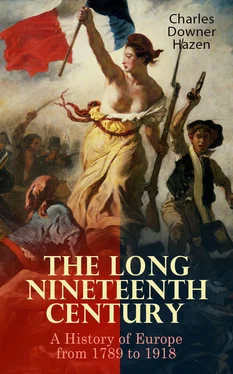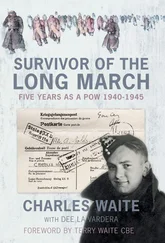1 ...8 9 10 12 13 14 ...35 The real, prosaic work was done in the thirty-six 'generalities,' as another set of divisions was called. Over each of these was an intendant who was generally of the middle or bourgeois class, accustomed to work. These intendants were appointed by the king to carry on the royal government, each in his own district. They generally did not originate much, but they carried out the orders that came from the capital and made their reports to it. Their power was practically unrestricted. Upon them depended in large measure the happiness or the misery of the provinces. Judging from the fact that most of them were very unpopular, it must be admitted that this, the real working part of the national government, did not contribute to the welfare of the people. The intendants were rather the docile tools of the misgovernment which issued from the five councils which were the five fingers of the king. As the head is, so are the members, and the officials under the intendants for the smaller local areas enjoyed the disesteem evoked by the oppressive or unjust policies of their superiors.
Speaking broadly, local self-government did not exist in France, but the local, like the national, government was directed and determined in Versailles. Were a bridge to be repaired over some little stream hundreds of miles from Paris, were a new roof required for a village church, the matter was regulated from Paris, after exasperating delay. It was the reign of the red tape in every sense of the word. The people stood like dumb, driven cattle before this monstrous system. The only danger lay in the chance that they might not always remain dumb. Here obviously was no school for popular political education a fact which explains many of the mistakes and failures of the people when, in the Revolution, they themselves undertook to rule, the monarchy having failed egregiously to discharge its functions efficiently or beneficently.
Let no one suppose that because France was a highly centralized monarchy, culminating in the person of the king, that therefore the French government was a real unity. Nothing could be further from the truth. To study in detail the various aspects of the royal government, its divisions and sub-divisions, its standards, its agents, its methods of procedure, is to enter a lane where the mind quickly becomes hopelessly bewildered, so great was the diversity in the machinery employed, so varied were the terms in use. Uniformity was nowhere to be seen. There was unity in the person of the king, necessarily, and there only. Everywhere else disunity, diversity, variety, without rhyme or reason. It would take a volume or many volumes to make this clear - even then the reader would be driven to despair in attempting to form a true mental picture of the situation. The institutions of France were a hodge-podge chaos erected into a system, with no loss of the chaotic, and with no system. Nowadays the same laws, the same taxes, the same weights and measures prevail throughout the length and breadth of the land. But in 1789 no such simplicity or equality prevailed. Weights and measures had different names and different values as one moved from province to province, sometimes as one moved from village to village. In some provinces taxes were, not determined, but at least apportioned, by certain people of the province. In other cases this apportionment was effected directly by the agents of the king, that is, by the central government. In some parts of France the civil laws, that is, the laws that regulated the relations of individuals with each other, not with the state, various were of Roman origin or character. There the written law prevailed. In other sections, however, mainly in the north, one changed laws, Voltaire said, as one changed post-horses. In such sections the laws were not written but were customary, that is, feudal in origin and in spirit. There were indeed 285 different codes of customary laws in force, that is 285 different ways of regulating legally the personal relations of men with men, within the confines of France.
Again the same diversity in another sphere. Thirteen of the provinces of central France enjoyed free trade, that is, merchandise could move freely from one end of that area to the other without restriction. But the other nineteen provinces were separated from each other, just as nations are, by tariff boundaries, and when goods passed from one such province to another, they passed through custom-houses and duties were paid on them, as on goods that come from Europe to the United States.
All these diversities in laws, all these tariff boundaries, are easily explained. They were historical survivals, troublesome and irritating reminders of the Middle Ages. As the kings of France had during the ages annexed this province and then that, they had, more or less, allowed the local customs and institutions to remain undisturbed. Hence this amazing patchwork which baffles description.
One consequence of all this was the persistence in France of that feeling which in American history is known as the states-rights feeling. While all admitted that they were Frenchmen, provincial feeling was strong and frequently assertive. Men thought of themselves as Bretons, as Normans, were attached to the things that differentiated them, were inflexible or stubborn opponents of all attempts at amalgamation. Before France could be considered strongly united, fusion on a grand scale had to be accomplished. This was to be one of the memorable and durable achievements of the Revolution.
The financial condition of this extravagant and inefficient state was deplorable and dangerous. Almost half of the national income was devoted to the payment of interest on the national debt. Expenditures were always larger than receipts, with the national result that there was an annual deficit which had to be met by contracting a new loan, thus enlarging the debt and the interest charges. It appeared to be the principle of state finance, not that expenditures should be determined by income, but that income should be determined by expenditures. The debt therefore constantly increased, and to meet the chronic deficit the government had recourse to well-known methods which only aggravated the evil - the sale of offices, new loans. During twelve years of the reign of Louis XVI, from 1776 to 1788, the debt increased nearly $600,000,000. People became unwilling to loan to the state, and it was practically impossible to increase the taxes. The national finances were in a highly critical condition. Bankruptcy impended, and bankruptcy can only be avoided in two ways, either by increasing receipts or by reducing expenditures, or both. Attempts were made in the one direction and in the other, but were ineffectual.
The receipts, of course, came from the taxes, and the taxes were already very burdensome, at least for those who paid them. They were of two kinds, the direct and the indirect. The direct taxes were those on real estate, on personal property, and on income. From some of these the nobles and the clergy were entirely exempt and they therefore fell all the more heavily upon the class that remained, the third estate. From others the nobles, though not legally exempted, were in practice largely freed, because the authorities did not assess noble property nearly as high as they did the property of commoners. Tax assessors stood in awe of the great. Thus the royal princes who were subject to the income tax and who ought to have paid nearly two and a half million francs, as a matter of fact paid less than two hundred thousand. Again, a marquis who ought to have paid a property tax of 2,500 francs paid 400 and a bourgeois in the same province who ought to have paid 70 in reality paid 760. Such crass favoritism, which always worked in favor of the nobles, never in favor of members of the third estate, naturally served only deeply to embitter the latter class. Those who were the wealthiest and therefore the best able to support the state were the very ones who paid the least, thus conforming to the principle that to those that have shall be given and from those that have not shall be taken away even that which they have. It has been estimated that the state took from the middle classes, and from the workingmen and peasants, half their annual earnings in the form of these direct taxes.
Читать дальше












